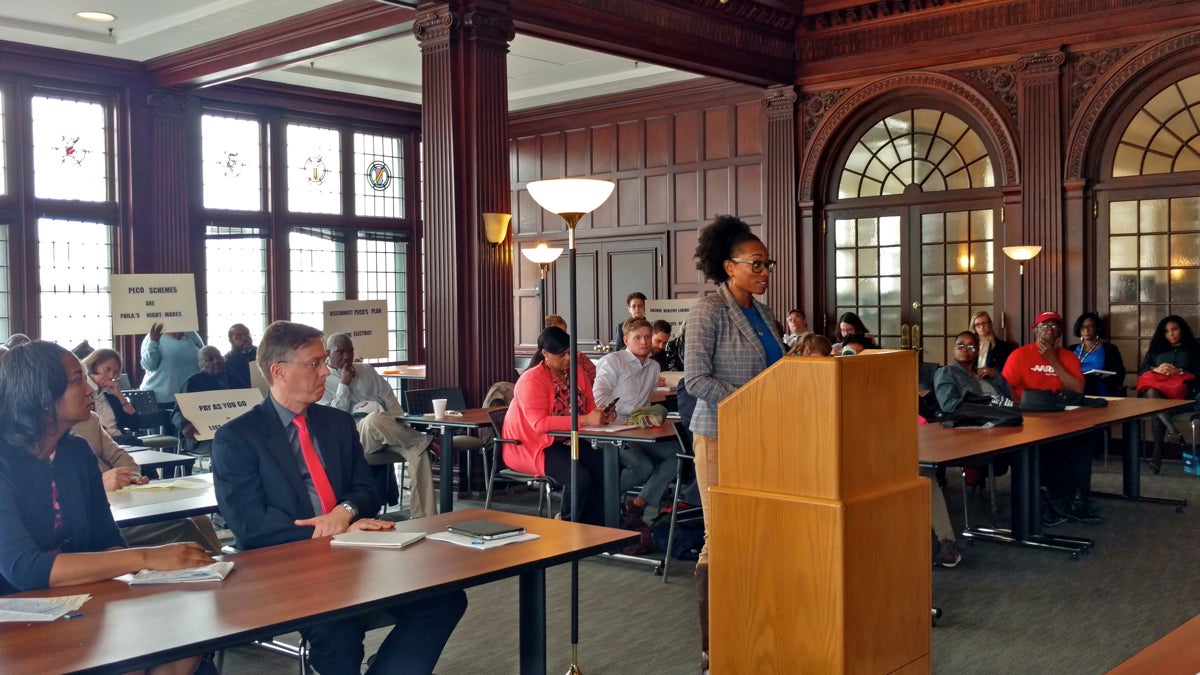Consumer advocates say PECO’s pre-pay electric plan has drawbacks

Markita Morris-Louis, senior vice president of community affairs and general counsel at Clarifi, a nonprofit credit counseling agency, testifies against PECO's proposal to pilot a prepaid energy plan during a public hearing in Philadelphia. (Katie Colaneri/WHYY)
PECO is asking Pennsylvania regulators for permission to start a pilot program giving customers the option to prepay their energy bills, but consumer advocates say that’s a bad idea— especially for the most vulnerable customers: the poor and the elderly.
PECO said a “pay-as-you-go” plan would help consumers use less energy and wants to try the program with up to 2,000 of its 1.6 million customers. But first, it will need approval from the Pennsylvania Public Utility Commission or PUC.
Opponents of the plan made their case Monday morning at a public hearing in Philadelphia. More than a dozen people argued the plan would strip away vital consumer protections for those who opt into the program. They echoed the concerns of several groups, including the Pa. Office of Consumer Advocate, that have already submitted comments to the PUC.
For example, many of those who testified said the plan would allow PECO to get around a ban on winter shutoffs for low-income people. State law requires utilities to maintain service for those below 250 percent of the federal poverty level (about $30,000 for a single person and $61,000 for a family of four) during the coldest months, even if they get behind on their bills.
Under PECO’s prepaid plan, customers who fail to load more credits to their account after a five-day grace period would be considered as choosing to disconnect their service. The utility has also said customers below 150 percent of the federal poverty level are not eligible for the pilot program.
Markita Morris-Louis is senior vice president of community affairs and general counsel for Clarifi, a nonprofit housing and credit counseling agency. She worries the plan would take advantage of her clients who are on fixed incomes and may not realize the implications of signing up.
“They may not read the fine print,” Morris-Louis said. “They may not see what they’re giving up in exchange for this program and just see an opportunity and so that’s what we are concerned about.”
Another concern raised at the hearing was the potential impact on customers who need electricity to chill medications or power medical devices.
State law requires all utilities to allow customers with medical emergencies to avoid having their service shut off by asking for a “medical certificate,” which involves having their doctor write a note or call the utility explaining the condition.
But retired nurse Barbara Schraeder pointed out the process could be more “onorous” for those on the prepaid plan because they have to switch back to a typical monthly plan before they can receive medical certificate. She worries if the certificate is not approved before the five-day grace period, sick customers could lose their heat and electricity.
“It’s a way for the company to collect upfront costs without providing any assurances of service if you get into trouble,” Schraeder said.
According to PECO spokesman Ben Armstrong, customers who opt into the prepaid plan can transition back to a traditional plan any time. However, if a medical certificate is not filed and approved before the five-day grace period is over, Armstrong said “their service would be terminated in accordance to the termination procedures for that type of account.” If a customer’s service is terminated, they could be required to pay reconnection fees of $20 to $1,650, depending on the work needed to shut the service off.
The Hon. Angela T. Jones, an admnistrative law judge for the Pennsylvania Public Utility Commission, oversaw Monday’s hearing and said she will rule early next year about whether PECO’s plan is in the public’s interest. The commission will make a final decision sometime after that and can accept, reject or modify Jones’ ruling, said PUC spokesman Nils Hagen-Frederiksen.
WHYY is your source for fact-based, in-depth journalism and information. As a nonprofit organization, we rely on financial support from readers like you. Please give today.




